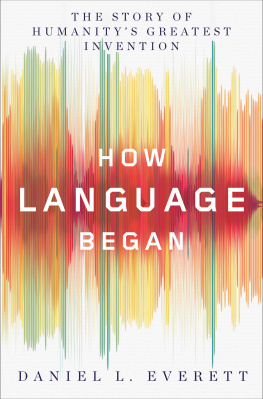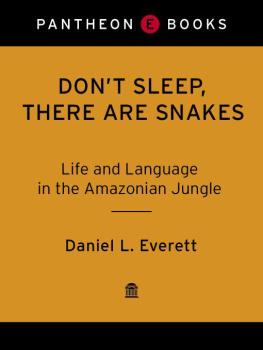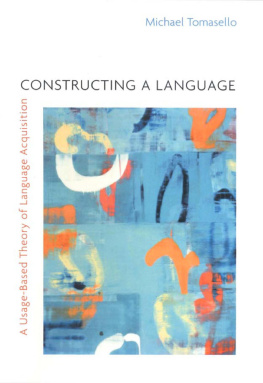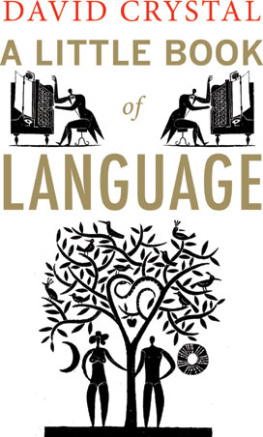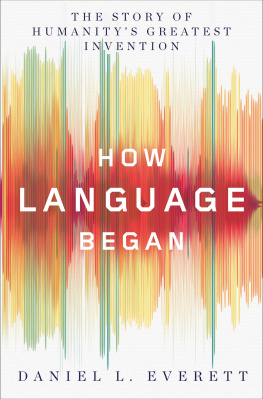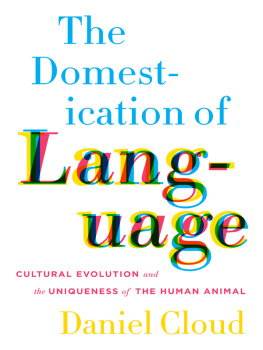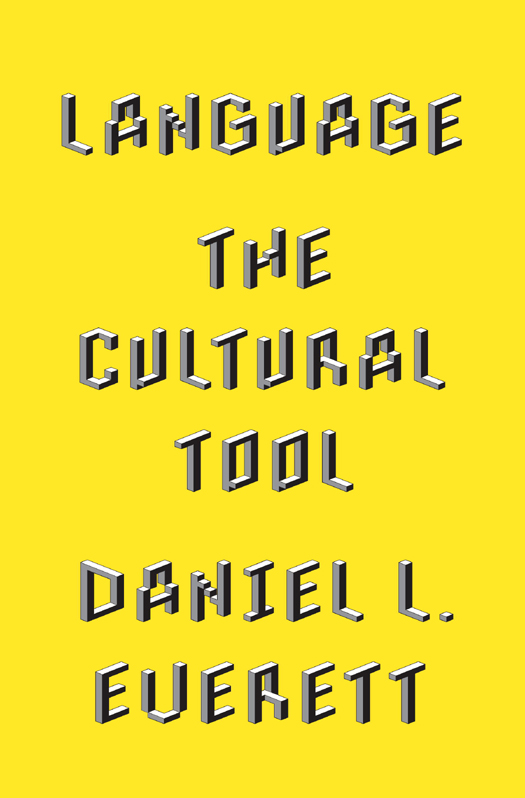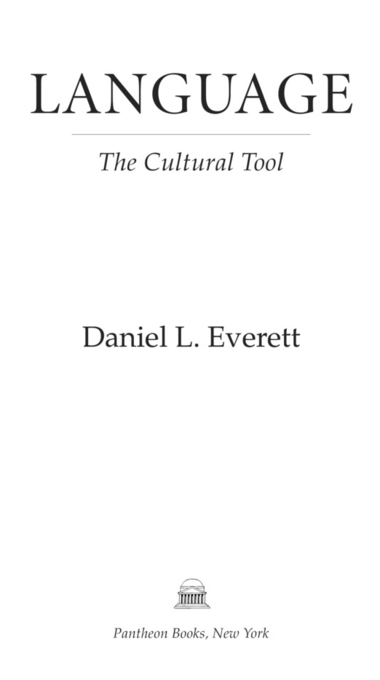Copyright 2012 by Daniel L. Everett
All rights reserved. Published in the United States by Pantheon Books, a division of Random House, Inc., New York, and in Canada by Random House of Canada Limited, Toronto. Published simultaneously in Great Britain by Profile Books Ltd., London.
Pantheon Books and colophon are registered trademarks of Random House, Inc.
Library of Congress Cataloging-in-Publication Data
Everett, Daniel Leonard.
Language : the cultural tool / Daniel L. Everett.
p. cm.
Includes index.
eISBN: 978-0-307-90702-8
1. Language and culture. 2. Communication. 3. Sociolinguistics. I. Title.
P35.E913 2011 400dc23 2011034829
www.pantheonbooks.com
Cover design by Brian Barth
v3.1
To my mentors and former officemates,
Marcelo Dascal and John Searle,
rare teachers both
Contents
Instead of notions borrowed from books and immediately changed into philosophical concepts, I was confronted with the lived experience of native societies, by the commitment of the observer. My mind escaped from the claustrophobic steam bath to which it had been confined by the practice of philosophical reflection. Led to the open air, it felt refreshed by the new breath. Like a city-dweller released in the mountains, I became intoxicated, while my dazzled eyes examined the richness and variety of the scene.
Claude Levi-Strauss, Tristes Tropiques (1955)
If a man is offered a fact which goes against his instincts, he will scrutinize it closely, and unless the evidence is overwhelming, he will refuse to believe it. If, on the other hand, he is offered something which affords a reason for acting in accordance to his instincts, he will accept it even on the slightest evidence. The origin of myths is explained in this way.
Bertrand Russell, Proposed Roads to Freedom (1918)
Preface
People of the twenty-first century are developing new technologies that have already altered the foundations of learning, teaching, art, science, politics, government, business, music, and literature. The most interesting aspect of these exciting innovations is that they are all made possible by a single tool, human language, instrumentum linguae.
The idea that language is a tool has been around for a long while. Lev Vygotsky, the great Soviet psychologist, was one of the first to make this claim explicitly in modern times, though Aristotle framed language in these terms more than 2,300 years ago.
But no one has quite gotten around to weaving together the findings of modern linguistics, psychology, and anthropology to flesh out the meaning of the hypothesis that language is an artifact, a cultural tool. An instrument created by hominids to satisfy their social need for meaning and community. This is our ambitious project.
Some experts say language is an instinct, rather than the invention of a community of minds. Most, however, believe that instincts are simple, unlearned reflexes. An instinct is a babys desire to suckle. But language is learned and complex, a work of function and form developed and honed by human cultures since the dawn of our species.
Introduction
THE GIFT OF PROMETHEUS
Then Prometheus, in his perplexity as to what preservation he could devise for man, stole from Hephaestus and Athena wisdom in the arts together with fire since by no means without fire could it be acquired or helpfully used by any and he handed it there and then as a gift to man.
Platos Protagoras
T he Greeks told a myth about one of mankinds greatest tools, fire. The storys hero was Prometheus, whose name means foreseer. Prometheus grew fond of the creatures that Zeus had asked him to help create, man and woman. He watched them with pity as they huddled cold and fearful of the dark, stumbling blindly after every setting of the sun. He knew the solution to their problem fire. But Zeus did not want humans to have fire. Fire would give humans more power than Zeus intended. They might even rival the gods themselves. So Zeus forbad it.
Prometheus knew the risks of disobeying the king of the gods. Yet for pity and for love he smuggled a charcoal lit by Apollos fiery chariot out of Olympus in a fennel stalk. No matter how pure his motives, Prometheus paid a horrible price for his charity. Zeus condemned him to an eternity of pain chained to a rock in the Caucasus, where each day his liver was consumed by a large vulture, regenerating every night in order to fuel his pain on the morrow. Only when the mighty Hercules slew the vulture and broke the chains was Prometheus freed.
The myth of Prometheus, like all good myths, encapsulates cultural values and offers answers to keep a group of Homo curious satisfied until a better answer comes along. In this myth we can take away the belief that fire originated once in the human story. We are given a glimpse of the problems that fire was meant to solve. And we are taught that the coming of fire was a momentous event in human history.
The Hebrews myths also include a narrative about their gods coming to fear the growth of human power. But the Hebrew story differs dramatically from the Greeks. The Hebrews scriptures recognize that the power of language is greater than that of fire. The Hebrew god is not threatened by humans control of fire, but rather by their ability to talk to one another. From this appreciation for the power of language emerges the Hebrew myth of the Tower of Babel the tower that was raised to threaten the gates (Bab) of god (El). In this myth God is not worried about the physical technology of his creation, whether picks, axes, fire, or the like. He is instead infuriated by humans ability to work together. This threatens his power. And their cooperation rests upon on their communication. So God scatters his people across the face of the earth. Or as the Bible puts it:
And the LORD said, Behold, they are one people, and they all have the same language. And this is what they began to do, and now nothing which they purpose to do will be impossible for them. Come, let Us go down and there confuse their language, that they may not understand one anothers speech. So the LORD scattered them abroad from there over the face of the whole earth; and they stopped building the city. Therefore its name was called Babel, because there the LORD confused the language of the whole earth; and from there the LORD scattered them abroad over the face of the whole earth.
Genesis 11: 69 New American Standard Bible
Ironically, the Hebrew god was not a linguist. He did not seem to realize that diversity strengthens Homo sapiens, and diversity in language and culture strengthens us the most. According to the Bible, God created one man, Adam, and gave him the charge of learning about and naming the flora and fauna of creation. By spreading Adams descendants around the globe God in effect created a thousand Adams, learning about and naming not just the Garden of Eden, but the entire world wherever the children of Prometheus have gone, they have taken fire and language to master and learn about their world. This means that no one of us speaks the right language. We all speak the language(s) that helps us and these languages are formed to meet the needs of our culture and social situation.
The Hebrews were right about one thing, though. The uttering of the first noun or verb, as non-momentous as that sounds, was arguably of greater importance than the stealing of fire from the gods of Olympus. Nouns and verbs are the basis of human civilization. Without these and other words, we could not utter history and life-changing phrases like I now pronounce you man and wife, This must be the place, or I name this ship the


